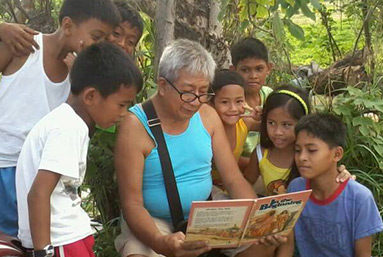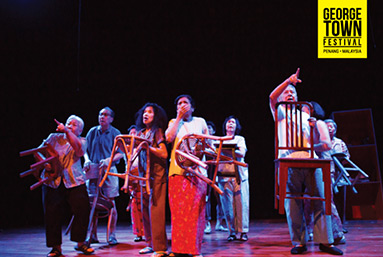As communities grow older, a resilient community is one where older person feel valued by society, have platforms to voice their opinion, and have meaningful opportunities to engage and influence younger generations. Often the ways in which governments and the media engage and portray older people can constrain the diversity and authenticity of their voices. In addition, generational divides exist in many societies, due to differences in outlook and experiences, limited interaction opportunities, language, and communication barriers.
As a result, older persons may face diminishing control to influence social interactions, services, and support that they need, promoting negative perceptions of ageing and disengagement. Availability of meaningful platforms and opportunities for older persons to represent themselves, be listened to and engage others, not only encourages them to participate, but also empowers them with greater purpose and generativity, towards better well-being and resilience in later life.
- Encourage family bonding through routines such as storytelling or other family activities by older persons to younger generations. The culture of storytelling is especially rooted in Philippines by older persons as a way to build intergenerational solidarity and cultivate a sense of shared identity, see Case Study 1.4a.
- Facilitate workshops to induct older persons into using arts form such as drama, theatrical, storytelling to communicate or share their experiences or stories from their perspectives. See Case Study 1.4b on the pioneering seniors’ theatre group that was set up in Singapore and how it promotes intergenerational bonding.

A prominent part of Filipino culture is storytelling. As a family-oriented nation, grandparents are the matriarch/patriarch of families and their communities. Stories are typically told by grandparents or older persons to the younger generation as a way of preserving history, experiences, teaching knowledge, imparting values, and wisdom.
For example, there are stories that impart indigenous and community knowledge on flooding and disasters, such as strategies of reading clouds and riffs, organic hazard mapping. They are an avenue for the older persons to establish their capability and develop the next generation. This indispensable role of older persons to do storytelling has been long established in Philippines, and enacted through children’s books, plays and TV series.

The Glowers Drama Group is Singapore’s pioneering seniors’ theatre group that create performances in English, Mandarin, various Chinese dialects, Malay, and Tamil for both corporate audiences, as well as lower-income and isolated older persons.
In addition to these audiences, the group also participate in intergenerational drama workshops with youths in primary and secondary schools where they are facilitated to exchange perspectives on different topics and ask other questions through casual conversations. Participants then reflect on their interactions to suggest what they have learnt from one another and can showcase in the form of short skits that are performed in more intimate settings with their family and friends as their audience.
- Appoint older persons as mentors in schools and consultants in NGO and local government programs to feature them as assets of the community. The knowledge, experiences, and wisdom that they have accumulated through the years can be utilized and appreciated by community in youth development, community planning and risk management. See Case Study 1.4c, on how older persons in Philippines are consulted to manage ongoing disasters.
- Offer honorarium to participating older persons for their contributions to community development to ensure their continued integration and involvement and to assign them with roles and responsibilities that increase their sense of purpose.

Older persons are often appointed in Philippines as the Disaster Risk Reduction Focal Person at each Barangay level to help and support barangay officers in preparing and managing ongoing floods. Older persons’ assumption of the role of consultant in community planning against flooding has been very effective given the culture of respect for older persons and storytelling in Philippines. By involving older persons, the younger generations can learn from their stories of how the community used to come together to address the challenges of flooding, as well as indigenous knowledge for flood management, which boost the community knowledge and motivation to manage the risks of flooding.
- Help older persons feel comfortable and confident about communicating in their own language by recruiting or training community staff to speak in languages that older adults know. This good practice is particularly relevant to Singapore, where many older persons speak different languages from the younger generation and thus have problems communicating, see Case Study 1.4d.
- Create content in native languages that older adults can understand, see Case Study 1.4d.

While many older cohorts of Chinese older persons in Singapore speak dialects as their primary language, the use of dialects was banned in schools, government services and mainstream media as part of the speak mandarin campaign in 1979. As a result, less educated older persons often face difficulties understanding information in Mandarin and English, as well as communicating with younger generations. To create more familiar content for this target group, a Singapore local arts group 3 pumpkins initiated an online project Say Louder Teahouse that records contemporary stories, or current affairs in Chinese dialects, Malay and Tamil to provide information and entertainment during the pandemic period. The art group also bought receivers for 6000 seniors which were preloaded with the recordings so older persons can playback anytime, anywhere.
- Create spaces within community organizations for older persons to voice their needs, and linking them up to wider structures such as the local council and government agencies to provide information and co-create solutions, see Good Practice 3.5.
- Train willing older persons to be social media influencers to help address established ageing stereotypes and prejudices.
- Appoint older persons to be spokespersons on ageing issues in their community and provide them with relevant media training to amplify their voices through letters to newspaper, calls to redo stations and so on. Representation of older persons in the mainstream media helps both the older persons and the younger generation in constructing more positive and accurate perceptions of ageing.
These good practices to improve older persons’ influence and voice allows them to better communicate their needs, perspectives, foster closer intergenerational ties and solidarity. Not only can older persons impart their knowledge and experiences to contribute to the community development and skills, but it also ensures that community services and support are better designed to support their needs. Taking on roles to mentor the next generation often imbues older persons with a sense of purpose, encouraging them to participate through a greater sense of generativity. Together, this promotes the development of a more inclusive and cohesive community culture (CC4) where individuals across ages and generation can better understand and appreciate one another.
- Sustainability of such international bonding programs initiated by the community is required to achieve long-term effects. Institutionalizing these programs by integrating them at the local government or national level as part of the education curriculum should be considered.
- Empower older adults to have a voice, by educating them about their rights and entitlements, and channels by which they can participate to voice out areas they are concerned with.
- Consider ways in which multiple non-profit community organizations can partner one another, to amplify voices of older persons. More details on how to do so, can be found in this toolkit by HelpAge on promoting voices of older persons.

from javascript
from javascript